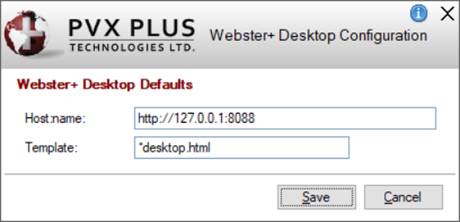
|
*WEBSTER/DESKTOP |
Display Webster+ Page |
Webster+ provides the ability to create true Web-based applications utilizing many of the tools and accessories found in the NOMADS development environment. This makes it easier and faster to develop Web applications, and the Webster+ Desktop application (*webster/desktop) provides a means to seamlessly integrate the new Web-based programs into an existing Windows desktop package.
Using *webster/desktop, the system can run a Webster+-based Web page in a Windows container that allows it to look like a Windows application. This allows you to work on developing a Web-based solution, phasing the new application into your existing Windows solution over time without it looking out of place.
(The *webster/desktop utility was added in PxPlus 2022 Update 1.)
|
1. |
Display Page: |
CALL "*webster/desktop", ERR=stmtref, page$, values$, host$, template$ |
|
2. |
Run/Display Program: |
CALL "*webster/desktop;Run",ERR=stmtref, program$, values$, host$, template$ |
Where:
|
|
page$ |
Name of the page to be displayed. |
|
|
program$ |
Name of the program to be run/displayed. |
|
|
values$ |
A semi-colon delimited list of variables and associated values to be passed to the page/program on the generated URL. Variable name and value are separated by an equals sign. |
|
|
host$ |
Name of the host. This should be in the form of http://server.domain or https://server.domain. If omitted, the default name of http://127.0.0.1:8088 is used (this can be changed by running *webster/desktop;Setup). |
|
|
template$ |
Name of the template to use. The default is *desktop (this can be changed by running *webster/desktop;Setup). |
Once called, this utility will create a window into which the specified Webster+ page will be displayed using the built-in PxPlus Chromium Browser Object. The window will, on initial display, be centered on the screen and occupy approximately three-quarters of the width and height of the display. The user can move/resize the page as desired with the new position and dimensions being preserved on the file webdesk.inf and used on any subsequent invocation of the same page/program by the same user/workstation.
The *webster/desktop program can be added to the PxPlus IDE or used in a Windows short cut.
When defined as a task in the PxPlus IDE, the Panel/Program parameter should be *webster/desktop (or *webster/desktop;Run) with the following parameters:
|
|
Parameter 1: |
Page/program |
|
|
Parameter 2: |
Values (if any) |
|
|
Parameter 3: |
Host name with the http/https suffix included |
|
|
Parameter 4: |
Template file to use |
When defining a Windows short cut, the values following -arg would coincide with the above parameter list.
The Webster+ Desktop utility uses the file webdesk.inf to maintain both the system defaults for host and template, along with the size/position for pages the user has previously used.
To define the default host address and template to use, either of the following methods can be used:
|
Location |
Method |
|
From the PxPlus IDE Main Launcher |
Expand the Web Deployment category and select Webster+ Desktop Configuration. |
|
From the PxPlus Command window |
Enter: RUN "*webster/desktop;Setup" on a Windows system. |
The Webster+ Desktop Configuration window is displayed:
This window consists of the following:
|
Host:name |
Enter the name of the host. This should be in the form of http://server.domain or https://server.domain. If omitted, the default name of http://127.0.0.1:8088 is used. |
|
Template |
Enter the name of the template to use. The default is *desktop.html. |
|
Save |
Saves the settings entered so that the next time the Webster+ Desktop Configuration window is invoked, it will default to the saved settings. |
|
Cancel |
Closes the Webster+ Desktop Configuration window and does not save any changes. |
As part of the *webster/desktop utility, you can call *webdesk to display any URL inside the Windows container. The URL can be passed as the first and only parameter being a string value containing the URL to display.
Example:
call "*webdesk","http://www.pvxplus.com"
Like *webster/desktop, the first invocation will be in a centered window, approximately three-quarters of the width and height of the screen. The user may resize/position this window as desired, and the system will use this new size/position when the window is next displayed.